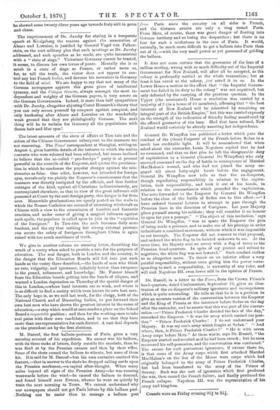General De Wimpffen has published a letter which puts the
conduct of the (then) Emperor of the French before Sedan in a much less creditable light. It will be remembered that when asked about the surrender, Louis Napoleon replied that he had no command, and that on that plea he left the disagreeable duty of capitulation to a General (General De Wimpffen) who only assumed command on the day of battle in consequence of Marshal MacMahon's wound, and who had not joined the army en- gaged till about forty-eight hours before the engagement. General De Wimpffen now tells us that the ex-Emperor, though repudiating responsibility in relation to the capitu- lation, took responsibility, and took it out of his hands, in relation to the circumstances which preceded the capitulation. The note forwarded to the Emperor by General De IVimpffen before the close of the battle of Sedan ran to this effect :—"I have ordered General Lebrun to attempt to pass through the Prussian lines in the direction of Carignan. Let your Majesty place yourself among his soldiers ; they will consider it an honour to open for you a passage." " The object of this invitation," says General De Wimpffeu, " was to spare the Emperor the pain of being made a prisoner, and to make use of his prestige in order to facilitate a combined movement, without which it was impossible to cut through. The Emperor did not consent to that proposal, and ordered the white flag to be hoisted unknown to me. At the same time, his Majesty sent an envoy with a flag of truce to the Prussian head-quarters. In spite of my protest and refusal to negotiate, the white flag was not lowered." Such conduct strikes us as altogether mean. To throw on an inferior officer a very painful responsibility, without even giving him the power corre- sponding to such a responsibility, is unworthy of any ruler, and will sink Napoleon III. even lower still in the opinion of France.






























 Previous page
Previous page